BAGOINGED, Pikit, North Cotabato (MindaNews / 10 February) – A facility to “reform” drug dependents, built a few meters away from a mosque and guarded by members of the Bangsamoro Islamic Armed Forces (BIAF), the soon-to-be-decommissioned armed wing of the Moro Islamic Liberation Front (MILF), has received around 150 “pasyente” (patients) since it opened on May 1, 2014, mostly turned over to them by parents.
There are no medicines to treat the Moro drug dependents here at the BIAF’s Eastern Mindanao Reformatory Center. But the warden, Yusoph Mohamad, is confident that after a minimum stay of six months or maximum of one year, the drug dependent will not go back to his old ways.
The cure, according to Mohamad, is “Islamization,” instilling Islamic values in the “bikitma ng droga” (victims of illegal drugs).
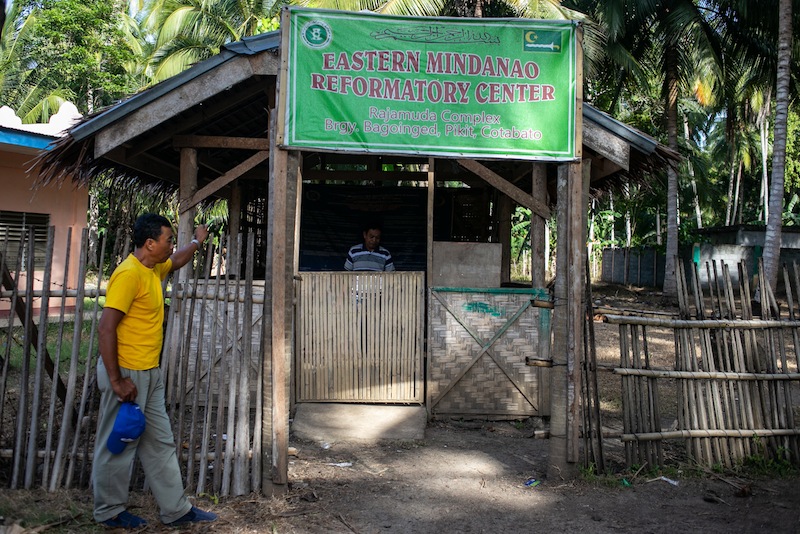 The Eastern Mindanao Front Reformatory Center of the Bangsamoro Islamic Armed Forces, the soon-to-be-decommissioned armed wing of the Moro Islamic Liberation Front in Barangay Bagoinged, Pikit, North Cotabato. MindaNews photo by MANMAN DEJETO
The Eastern Mindanao Front Reformatory Center of the Bangsamoro Islamic Armed Forces, the soon-to-be-decommissioned armed wing of the Moro Islamic Liberation Front in Barangay Bagoinged, Pikit, North Cotabato. MindaNews photo by MANMAN DEJETO
“Sa aming observation, mas effective ang Islamization kaysa gamot” (In our observation, Islamization is more effective than medicines), he said, adding, “if Islam enters the heart of anyone, even if you give him drugs, he will no longer use that because he is afraid of Allah. He will do no wrong.”
At the reception kiosk of the center late afternoon of February 7, Mohamad told MindNews that they monitor their “pasyente” when they leave the facility and have not heard of anyone who has turned back to drugs. No one has been returned to the center, too, he said.
Mohamad recalled that the reformatory was a priority program of EMF commander Jack Abas as drug addiction among the Moro was becoming a major problem then and he felt something had to be done about the situation.
The reformatory accepts “biktima ng droga” on a “purely voluntary” basis, usually turned over to them by parents “for rehabilitation.”
When MindaNews visited on Feburary 7, they had 10 “pasyente,” the longest-staying completing five months two days later, while the 10th arrived only on February 3. Most of the “pasyente” are from “malalayong lugar” (faraway places).
All ten are “biktima ng droga.” Seven of them are “pamilyado” (heads of families).
The facility is generally for drug dependents but in the earlier part, Mohamad said, they accepted a few criminal offenders but only those with judgment from the Shariah court, with copies of their cases turned over to them as well.
Since 2014, the Reformatory has catered mostly to drug dependents, most of them from faraway places like, Mohamad said, Davao, Maguindanao’s Shariff Aguak, Talitay, Datu Paglas, Sultan Kudarat, Sultan Mastura; Cotabato City; Esperanza in Sultan Kudarat; Kidapawan, M’lang and Midsayap in North Cotabato.
The “rehabilitation” program consists of educating the “pasyente” on Islamic values. Twice a month, he said, a medical team from the Office of the Front Commander comes for medical check-up.
The medical team checks the “pasyente” and attends to minor illnesses only, he said.
“Wala kami talagang gamot sa drugs. Sa amin in-Islamize namin ang kanilang minds” (We do not have medicines for drugs. What we do is Islamize their minds), Mohamad said.
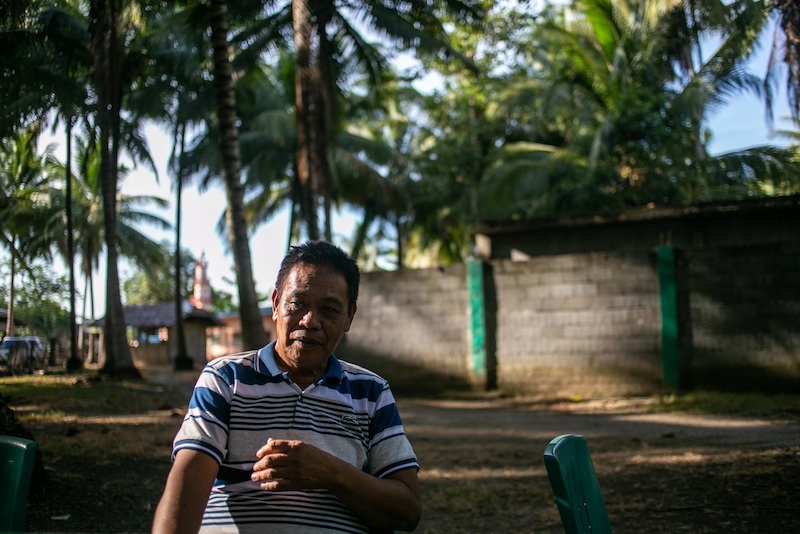 Yusoph Mohamad, warden of the Eastern Mindanao Reformatory Center of the Moro Islamic Liberation Front inside Camp Rajamuda in Barangay Bagoinged, Pikit, North Cotabao, explains why “Islamization” is the most effective way of rehabilitating a Moro drug dependent. MindaNews photo by MANMAN DEJETO
Yusoph Mohamad, warden of the Eastern Mindanao Reformatory Center of the Moro Islamic Liberation Front inside Camp Rajamuda in Barangay Bagoinged, Pikit, North Cotabao, explains why “Islamization” is the most effective way of rehabilitating a Moro drug dependent. MindaNews photo by MANMAN DEJETO
When they opened the reformatory in May 2014, they only had one patient. But by July 2014, word had gotten around that there was this facility for drug dependents at the MILF’s Camp Rajamuda. The camp is based in Barangay Rajah Muda but covers neighboring barangays like Bagoinged, where this reformatory is located. Soon, parents started bringing their children here.
The number of “pasyente” they received considerably increased when Davao City Mayor Rodrigo Duterte became President and launched his war on drugs. “Halos araw-araw” (It was like every day) as parents were afraid their sons would be arrested or something bad would happen to them, he said.
First steps
Once the “pasyente” is turned over to the reformtory, the parent or guardian signs “a waiver of rights.”
“Naka waive sa amin ang responsbility sa pag aruga sa kaniya” (Once they leave him with us, they have waived their rights over the person to us).
How would they know that the “pasyente” is “reformed”? MindaNews asked.
Mohamad said the first thing that the drug dependent loses is discipline and discipline is what they will gain, among others, in the reformatory.
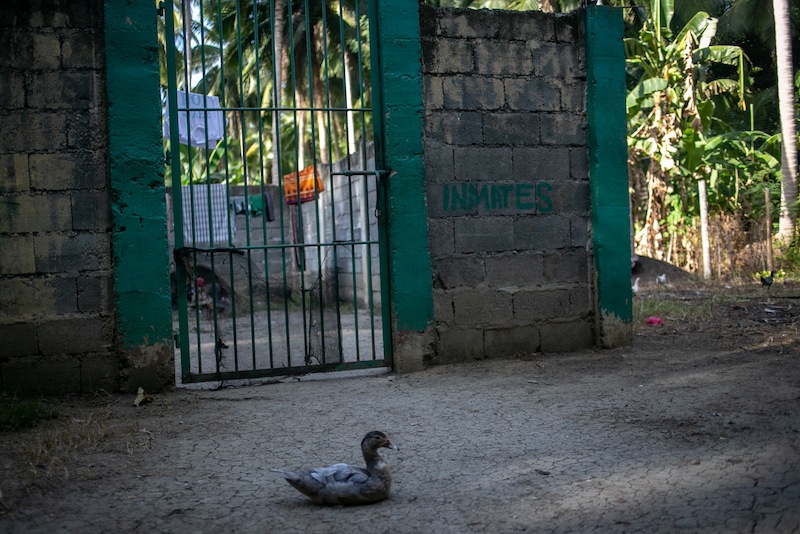 Farm animals are a common sight in the “playground” area of the Eastern Mindanao Reformatory Center of the Moro Islamic Liberation Front in Barangay Bagoinged, Pikit, North Cotabato. MindaNews photo by MANMAN DEJETO
Farm animals are a common sight in the “playground” area of the Eastern Mindanao Reformatory Center of the Moro Islamic Liberation Front in Barangay Bagoinged, Pikit, North Cotabato. MindaNews photo by MANMAN DEJETO
In the early weeks, he recalled, they kept all the “pasyente” in the detention center but later realized that keeping them inside will make them want to escape. They then tried to give them time to walk around what he refers to as “playground” and that turned out to be a positive step.
Mohamad noted that based on their experience, at the end of three months, “unti- unting babalik ang normality ng kanilang pag-iisip” (they are slowly going back to normality) and “hindi na sila mag-isip na tumakas pa” (they won’t think of escaping anymore). They just wait for three more months.
Detention center
Measuring 20 x 40 meters, the concrete structure has three cells with grilled windows, and a perimeter fence with a grilled gate facing the cooking area.
Built on land shaded by coconut trees, the entire compound – around a fourth of a hectare — is fenced off by palm fronds and bamboo, one corner with an opening easy enough for a person to escape.
The compound, however, is guarded by the BIAF. Outside the compound is still part of Camp Rajamuda so even if the “pasyente” dares to escape from the compound, he will face other BIAF members elsewhere.
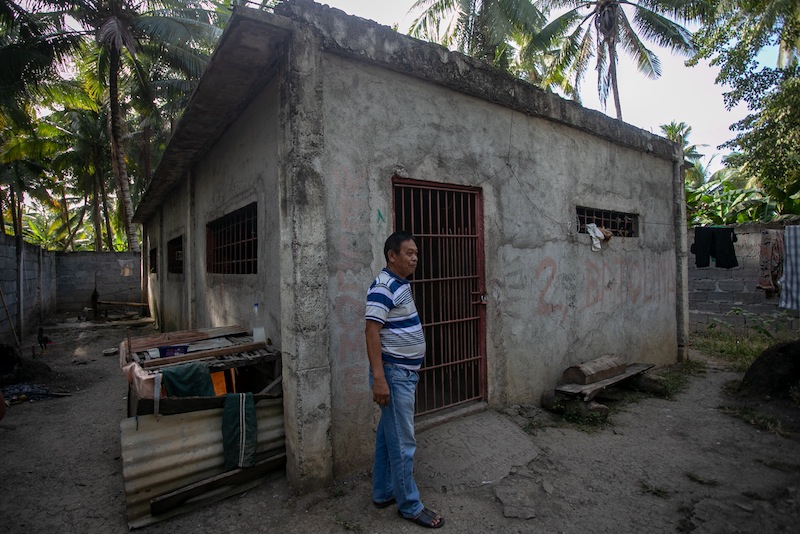 Warden Yusoph Mohamad shows the detention area of the Eastern Mindanao Reformatory Center of the Moro Islamic Liberation Front inside Camp Rajamuda in Pikit, North Cotabato on 7 February 2019. The building has three cells that could accommodate seven persons each. MindaNews photo by MANMAN DEJETO
Warden Yusoph Mohamad shows the detention area of the Eastern Mindanao Reformatory Center of the Moro Islamic Liberation Front inside Camp Rajamuda in Pikit, North Cotabato on 7 February 2019. The building has three cells that could accommodate seven persons each. MindaNews photo by MANMAN DEJETO
Mohamad said the “pasyente” is not allowed out of his cell in the first three weeks “kasi ayon sa mga drugs victim, kung ma-lowbat daw, talagang hahanapin nila ang kuan” (because according to the drug victims, they will really look for drugs once the effect of the last intake dissipates).
After three weeks, they can go out and walk around the “playground” or play basketball or do some livelihood projets but under guard of the BIAF, he said.
Day in the life of a “pasyente”
A day in the life of the “pasyente” means following the basics of Islam: praying five times, sometimes in the nearby mosque but inside the detention center at night.
Every three days, he said, an ustadz comes to teach the”pasyente” Islamic values, basically on what is right, what is wrong, Within the compound is a “classroom” not far from the detention center.
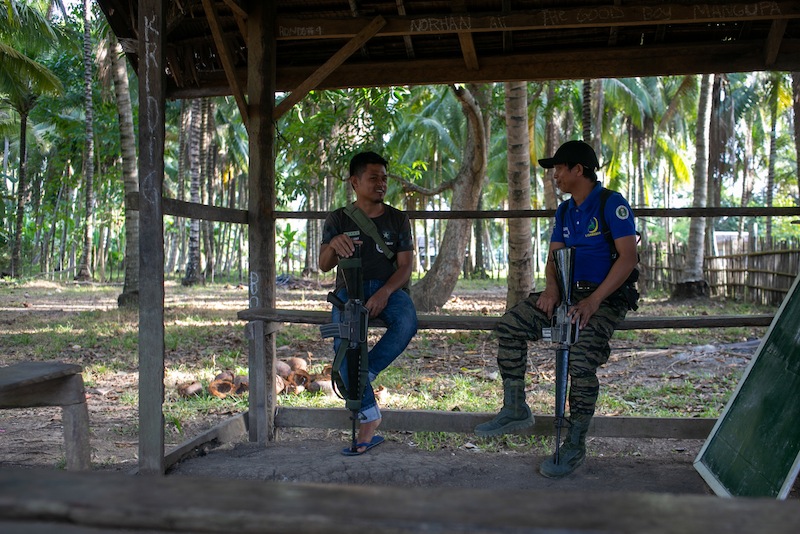 Bangsamoro Islamic Armed Forces personnel stay at the makeshift classroom while the “pasyente” are inside the detention area in the Eastern Mindanao Reformatory Center of the Moro Islamic Liberation Front in Barangay Bagoinged, Pikit, North Cotabato on 7 February 2019. The soon-to-be-decommissioned BIAF has been guarding the facility since it was established on may 1, 2014. MindaNews photo by MANMAN DEJETO
Bangsamoro Islamic Armed Forces personnel stay at the makeshift classroom while the “pasyente” are inside the detention area in the Eastern Mindanao Reformatory Center of the Moro Islamic Liberation Front in Barangay Bagoinged, Pikit, North Cotabato on 7 February 2019. The soon-to-be-decommissioned BIAF has been guarding the facility since it was established on may 1, 2014. MindaNews photo by MANMAN DEJETO
If the ustadz is not available, Mohamad says he teaches them and he also serves as Imam in the mosque.
The reformatory has its own set of rules. The “pasyente” should not harm the other or face punishment of “parang bartolina” (solitary confinement); should not open bags of their fellow “pasyente;” and should do their assigned tasks.
The “pasyente” are divided into groups assigned to clean, cook, fetch water, gather firewood for cooking. Cooking for dinner is mid-afternoon because they need to return to the detention center before darkness sets in.
Anyone who exhibits violence inside the cell or the “playground” is sent to solitary confinement – which is actually one of the three cells inside the 20 x 40 meter detention center, Mohamad said.
Each of the three cells can accommodate seven, he said.
No budget
Parents who send their sons to the center pay for their food and other daily needs.
“Wala kaming budget” (We don’t have a budget), the warden said.
A “pasyente,” Mohamad calcualated, needs 20 kilos of rice a month.
Some bring the rice supply to the center, others send money which is used to buy rice for the specific “pasyente.”
He said most parents bring rice rather than send cash although some of those who are far from the reformatory send cash, like the mother of “Alex,” a 26-year old tricycle driver and father of five who hails from a town in Maguindanao. (READ: Moro drug dependent: “uwi na ako kasi may anak na akong babae.”
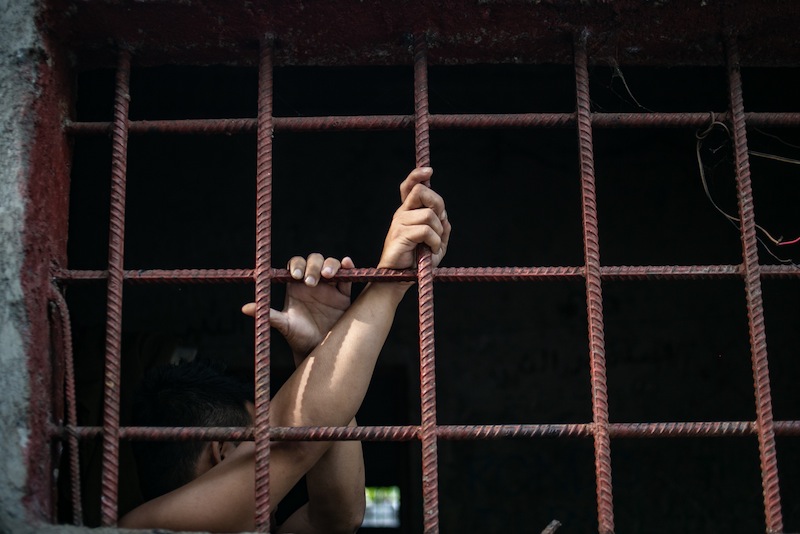 “Alex,” 26, a tricycle driver from a town in Maguindanao, father of five, has been staying at the Eastern Mindanao Reformatory Center of the Moro Islamic Liberation Front in Pikit, North Cotabato since September 9 last year. He wants to return home when he completes the minimum stay of six months and be father to his four sons and only daughter who was born three weeks ago. MindaNews photo by MANMAN DEJETO
“Alex,” 26, a tricycle driver from a town in Maguindanao, father of five, has been staying at the Eastern Mindanao Reformatory Center of the Moro Islamic Liberation Front in Pikit, North Cotabato since September 9 last year. He wants to return home when he completes the minimum stay of six months and be father to his four sons and only daughter who was born three weeks ago. MindaNews photo by MANMAN DEJETO
His mother, who works as a domestic helper overseas sends money for his rice (20 kilos estimated at 900 pesos a month) and allowance which Mohamad says the “pasyente” can use to buy what he wants from the neighboring store. The amount is not given lumpsum to the “pasyente.” If his parents sent him a thousand pesos a month, he knows he has that much but he is given only the amount he needs for the day.
The “pasyente” are not allowed to participate in military trainings of the BIAF, Mohamad said.
MILF chair Al Haj Murad Ebrahim and MILF Peace Implementing Panel chair Mohagher Iqbal know about the reformatory but have yet to visit it.
“They’re busy,” he said.
But Mohamad narrated there were police personnel from a town in Maguindanao who came to the reformatory to bring a “pasyente.”
He said parents who have heard about the reformatory asked the policemen’s help to bring their son here. Some policemen also bring drug dependents to the reformatory and even advise parents “mas mabuti na doon na lang sa reformatory ng Bangsamoro” (it’s better to bring them to the Bangsamoro reformatory), Mohamad added. (Carolyn O. Arguillas / MindaNews)
